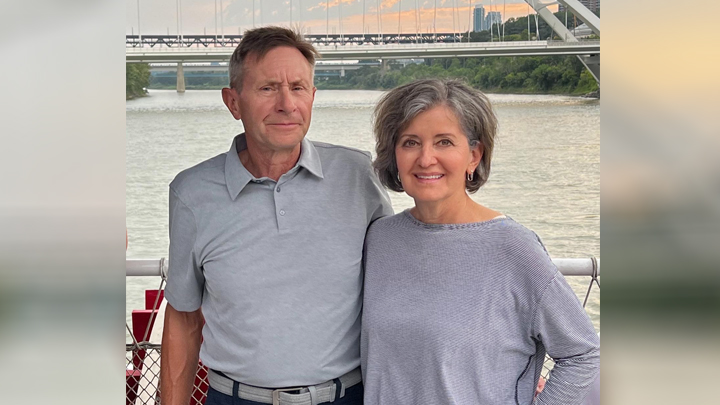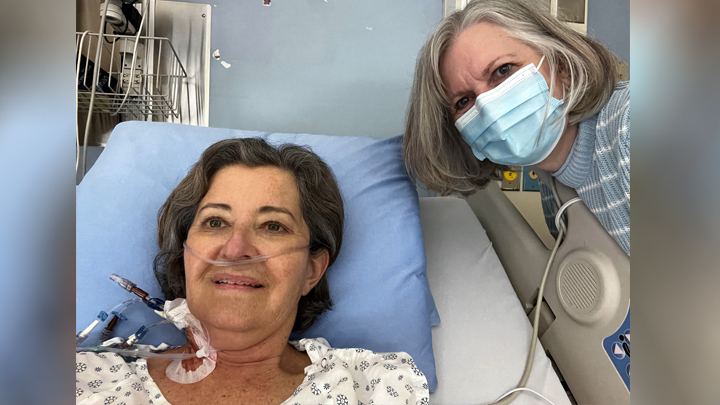
February 15, 2024

Linda Chupka’s husband Michael brought comforting food from home while she stayed in hospital for 11 days for her liver transplant.Photo supplied.

Linda Chupka’s best friend, Donalda Farwell, was one of two designated family/support person(s) throughout Chupka’s liver transplant. Photo supplied.

Kristine Russell, an AHS Patient and Family Advisor, believes that families play an important role in providing safe care to patients. Photo supplied.
Story by Katie McLaughlin
When Linda Chupka went into the University of Alberta Hospital for a liver transplant, she knew she would need as much support as possible during her recovery. Her husband, Michael, and best friend, Donalda Farwell, stepped into the role of Chupka’s designated family/support persons (DFSP).
“While I was in the intensive care unit, I was able to have one person with me at a time,” says Chupka, who received her transplant on April 25, 2022. “Michael and Donalda made an agreement on when they would come stay with me. They wanted to make sure I wasn’t alone. Donalda came in the morning and always brought a protein shake for me. Michael came in the evening and often brought me dinner from home.”
Chupka’s experience demonstrates the importance of DFSPs in a patient’s recovery. Alberta Health Services (AHS) defines a DFSP as one or more people identified by the patient as an essential support who they wish to be included in their care. This can be family, relatives, friends and informal or hired caregivers.
DFSPs play an important role in AHS’ Family Presence Policy, which welcomes these individuals to participate and collaborate as essential partners with the patient’s team to provide safe and quality healthcare services.
“We’re really trying to move the dial from family as visitors to family as partners in care,” says Deanna Picklyk, Director of Engagement and Patient Experience at AHS. “The role of a DFSP was added to AHS policy to better enable this. They play an important role in the care of the patient, in and out of the hospital, and their involvement is guided by the patient.”
For Chupka, her two DFSPs proved an integral part of her care team, both in and out of the hospital.
“After my surgery, I didn’t remember much, so having Donalda there to tell me right away how it went was helpful,” says Chupka. “They were both so involved in my care. Donalda even read my transplant binder so she could help me understand what to do — or what I couldn’t do. They both helped me get up and walk around, which was important to my recovery. It was so morally supporting to have them with me for the 11 days I was in the hospital.”
Chupka adds that she believes she wouldn’t have been as motivated to get better — and her mental health would have declined — without the support of her husband and Farwell. She attributes her quick recovery to the support she received, physically, mentally and emotionally. Even after her discharge from hospital, she felt well-supported by both her husband, Farwell and many friends who accompanied her to follow-up appointments and ensured she took her medications.
Kristine Russell, an AHS Patient and Family Advisor from Medicine Hat, also knows well the role family presence plays in the safety of patients. She’s been involved in a project with Alberta Children’s Hospital and Stollery Children’s Hospital to help improve pediatric patient safety.
She believes that family presence not only contributes to the support of a patient’s physical health, but also enhances their overall well-being, including their psychological, spiritual and cultural safety.
“If a patient is in the hospital, they may wish to incorporate aspects of their spiritual or cultural beliefs to aid in healing or finding comfort, but they might not know how,” says Russell.
“Their family can serve as advocates for their culture, spiritual and psychological needs. They can collaborate with the healthcare team to identify what’s important to the patient, integrating it into their care. Through meaningful conversations and collaborative efforts, we can work together, to aim to reduce recovery times and improve patient outcomes.”
Russell adds that DFSPs play a huge role in making the patient more comfortable while receiving care and also contributes to patient safety by helping monitor for signs of infection, identifying potential hazards, monitoring medication dispensing, recognizing signs of delirium and more.
“We know what ‘normal’ is for our loved one more than anyone else, so we can often recognize signs that something isn’t right sooner than others,” she says.
Family presence is widely recognized to contribute to improved patient outcomes, safety, enhanced patient experience, better workforce satisfaction, smoother transitions in care and much more.
“DFSPs are an important source of information about a patient’s health and social history, and they are an important voice for them,” says Picklyk.
“By partnering in care, healthcare providers can benefit from the two-way sharing of information about the patient, as well as the practical assistance and support to a patient’s emotional well-being that DFSPs provide.”
For more information about AHS’ Family Presence Policy, visit our website.